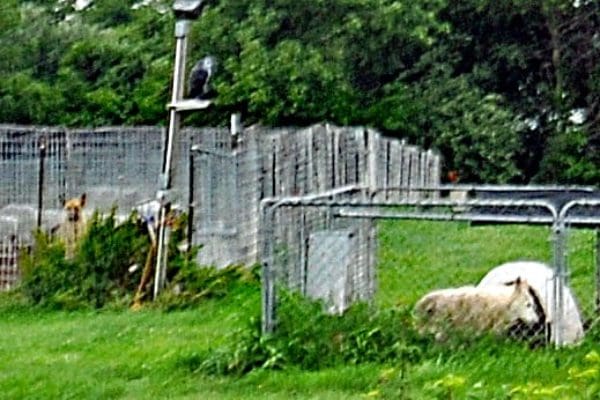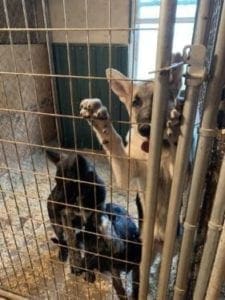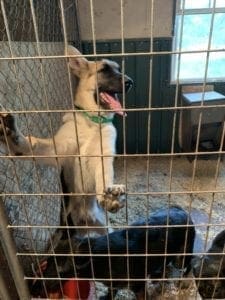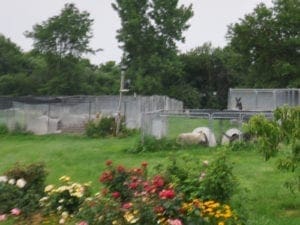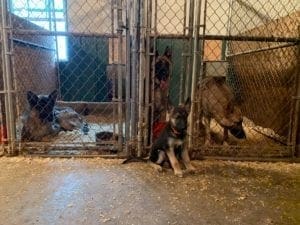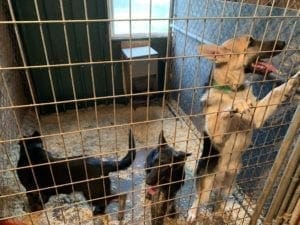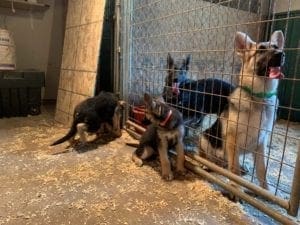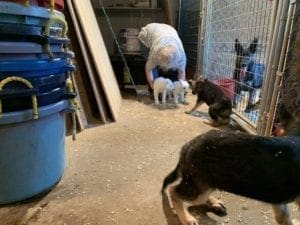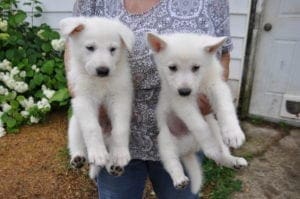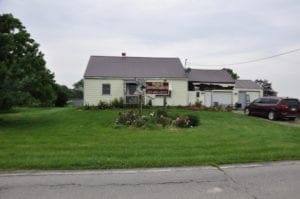In rural Indiana, 32 miles north of Indianapolis, German Shepherd breeder Rachel Clark’s 14-acre property and childhood home is (as of July 2019) home to 53 German Shepherd dogs, 15 puppies from three litters, and full-time, live-in caretaker Mark Melvin.
Clark, who breeds German Shepherds under the name “Raebark,” is listed as one of only two American Kennel Club German Shepherd Breeders of Merit in the state of Indiana.
Prestigious AKC designation aside, Clark would be the first to say that she has numerous detractors. She speaks often about the social media vitriol which swirled around her after local news stories surfaced in January 2019 about her dogs being kept in outside kennels in frigid temperatures. She told The Canine Review that the criticisms were “hurtful” and explained: “We didn’t have facilities to bring all the dogs in. If we could have, we would have.”
On Facebook, Clark answered critics by writing that she’d done everything she could to make sure her dogs were OK, saying that all of the puppies were indoors and that she had “brought every old dog inside” along with “any dog not acclimated to the cold.”
On a Saturday afternoon in June, Clark met The Canine Review at Raebark, where puppies and some adult dogs live indoors in an expanded garage. The remaining adult dogs are housed in several outdoor chain-link or steel wire kennels on an unfenced plot of grass behind the house. The kennels seemed adequately sized: Most are either 10 by 20 feet or 16 by 16 feet, with two dogs each in each. Asked about the dogs’ quality of life with regard to living outdoors in kennels, Mark Melvin, who has worked at Raebark for ten years, said in a telephone interview that he allows the dogs out to run on the property with his own dog. “When I’m doing the stalls in the morning, I turn them loose,” he said.
The garage where the puppies and some adults are housed felt more like a barn; there is plenty of natural light, high ceilings, and wooden pens. In one pen are two black and tan puppies that are about 12 weeks old. They are the remaining puppies from the litter of “Flair” and “Caesar.” Both puppies seemed shy, huddling against the wall. When Clark scooped them up and set them down on the garage floor, they both ran away. When moving toward them, speaking softly, they ran in the other direction.
“They aren’t normally that doggone shy,” said Clark.
Clark does not live at Raebark. She lives four miles down the road in town but comes each day to see the dogs. Her kennel worker, Mark Melvin, lives at Raebark and is the dogs’ full-time, primary caregiver. Melvin was not at Raebark the day of The Canine Review’s visit. Reached by phone and asked about the shy and fearful puppies, Melvin said, “If I was here, none of them would have been shy.” Melvin added, “Once they’re in that mode, you have to literally snap them out of that. You have to kind of take them out of that situation just for a minute and let them get happy.”
Clark showed more of the garage-turned-puppy-nursery and kennel. Along the side wall were another five chain-link kennels measuring four by six feet and five by six feet. In one kennel were three older puppies. In the next kennel, by himself, was Esky, a nine-year-old male. Two other adult dogs were in the next kennel over, and in another kennel, alone, was another older puppy from a previous litter.
Clark says she has been breeding German Shepherds at Raebark since the late 1990s. She studied veterinary medicine at Purdue University, and after earning her degree in 1967, she began practicing. She worked at the Indianapolis Humane Society in the early 1970s before taking a position at the Castleton Emergency Clinic, one of only two 24-hour veterinary clinics in the Indianapolis area at the time.
But in 1996, Rachel Clark’s veterinary career was interrupted:
She was found to be abusing hydrocodone, a powerful opioid, according to state Veterinary Board documents. In 2002, Clark’s veterinary license was reinstated and placed on probation; however, she remains unable to work with or prescribe controlled substances.
“No matter how hard I tried, I couldn’t fix this,” she says.
Inside the garage, Clark pointed out another litter of puppies, one week old on the day of TCR’s visit, huddled with dam “Dolly” in the second wooden pen. Dolly, who was 6 years old and the only surviving offspring from her mother, had had a litter which had started out with 12 puppies, Clark said, but two were stillborn and another puppy died within days.
As Clark and The Canine Review spoke, Dolly was suddenly spotted holding a puppy upside-down in her mouth with its head dangling back. Clark stepped closer to see. “Hey! Put it down! Shame on you. Shame on you!” she yelled.
She stepped in.
“What’d you do that for? You had something to do with this?” she continued to yell at Dolly.
Next, Clark picked up the motionless puppy and, sitting down with it on a concrete step, put her mouth to its mouth and blew a short breath. For the next 40 minutes, Clark continued with a mix of mouth-to-mouth blowing and chest compressions, massaging the puppy’s body in an attempt to revive it.
“I’ve done that with some of them before, and some of them get back and some of them don’t,” she said. “Through the years I’ve seen a number of these survive,” she added. “Oh yeah, I mean… It just depends on, you know, if the heart stops, you’re screwed. But if you’ve got anything left…”
At the end, there was nothing left. The puppy was limp on the table. Clark expressed concern about The Canine Review reporting about the death of a puppy.
“A lot of people are just convinced that if something dies, that you’ve done something wrong, and, they don’t realize that the nature of breeding is that you lose puppies.”
AKC Breeders of Merit must maintain memberships in AKC clubs. Clark is a current member of the Anderson Obedience Training Club, an AKC club, and takes dogs to classes there.
Pam O’Connor, a German Shepherd breeder in Oxford, Indiana, said she knows Rachel Clark and considers her a friend, but is an altogether different kind of breeder. O’Connor’s seven dogs live with her in her home, O’Connor explained in an interview. “I think of them as children, almost,” she said. “We watch television together. They follow me around the house…” When asked about Raebark’s much larger breeding operation, with dogs spending most of their lives in outdoor kennels, O’Connor said: “I think that when you go for quantity you lose quality. I mean quality of life.”
She told The Canine Review that she adopted a 10-month-old female German Shepherd from Clark because the dog seemed timid and she felt sorry for it. But the dog could not adapt to living in a home nor could it get along with her dogs.
Michigan resident Becky Howitt Helton, who purchased her first German Shepherd, “Major,” from Raebark in April of 2016, had nothing but good things to say about Clark. “He doesn’t have an aggressive bone in his body,” she said of Major in a telephone interview. “Not one. Everybody loves him.” Major is now a registered therapy dog and visits nursing homes, hospitals and schools, H
elton told The Canine Review. Everywhere she goes, she says, people rave about Major’s great temperament. “I tell them, I have a g
reat breeder. If you want a great dog, go see my breeder.”

